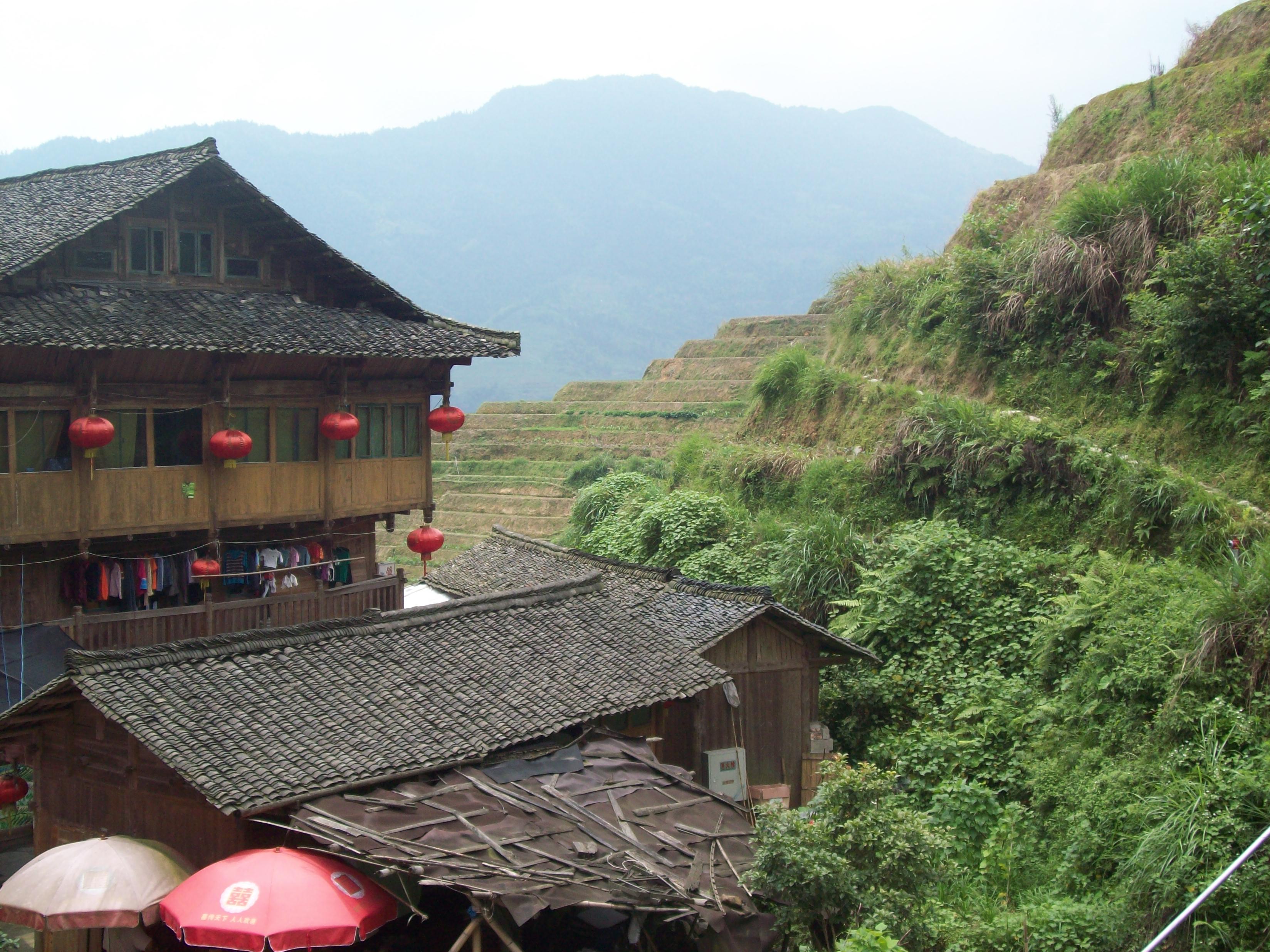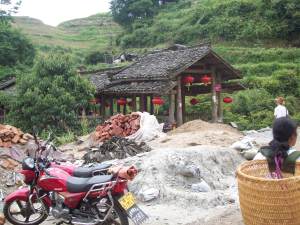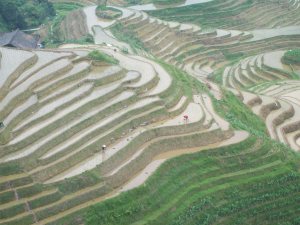
Last week, we arranged a trip to the Longji Terraced Fields, a favorite tourist destination two and a half hours from Guilin. A new guide named Bing picked us up for the long drive to the minority villages where the Zhuang and the Yao peoples have lived for more than thirteen generations and seven hundred years. We drove out of the city through villages that more closely matched my picture of rural China: dogs running into the road, bikes toting platforms piled with construction materials or watermelons, an old man in a coolie hat pushing a wheelbarrow. Along the road grew osmanthus trees and orange groves and rice, and tiny ducks floated on ponds.
Soon we turned up and up a narrow, winding mountain road, cliffs dropping abruptly alongside, a clear stream rushing by in the valley below, getting further and further away as we climbed. Our driver honked his way through every hairpin turn on the one-lane road. When we met another car or van or bus, somehow we squeezed by each other without slowing down. Waterfalls fell from the sides of the mountains and swinging bridges swayed high above the valley.
We stopped to buy tickets and a woman with elaborately knotted hair approached us, offering postcards for sale.
“She is Yao, married with children,” Bing murmured. He knew this, he explained later, because Yao women only cut their hair once in their lives, when they are sixteen. Then they wear their hair in styles that signify whether they are single, married, or married with children.
“What if they’re unmarried with children?” I asked.
He laughed and said, “There is no hairstyle for that.”
Oh, well, I thought. What single mother has time to do her hair?
Sophie was disappointed that there were only three categories. Why no hairstyle, she asked, for widows, or women who have lost children? “And what about widows with dead children?” she asked indignantly that night, right before dropping off to sleep.

Soon we began to ascend the mountain on foot. Zhuang women lounged at the entrance to the walkway, wearing turban-like head coverings made of colorful terry cloth that looked like soft absorbent cushions. All along the walk were stalls with embroidered pillow coverings and dresses and handcrafted earrings and toys, bags and jars of chili peppers, spreads of colorful fruits. Sedan chairs rested by the roadside, waiting for customers to pay to be carried to the top of the mountain by two strong men. In front of us, girls lugged large bamboo baskets on their backs.
After about 200 uneven, steep, sometimes slippery steps made of rock, the passages usually narrow with ravines dropping off sharply below and no guardrails, the sun glaring, the temperature somewhere in the neighborhood of 105, I was hot and thirsty and tired and a little dizzy. Bing, a young man who regularly leads tour groups on hikes here, and Sophie, who if she were home would have been right then on her way to the National YMCA Gymnastics Competition, mounted the steps briskly. I was starting to see why the brochure that had come with our tickets said, “Hiking should according to physical condition.”
Since I couldn’t keep up, I paced myself by stopping periodically to take pictures of the rice paddies cultivated by the Yao and Zhuang, according to our brochure, in “every corner of the valley, forest and cliffs.” They were amazing, like slices of bread staggered one on top of the next, or a bowl of scalloped potatoes.
Just when I thought I couldn’t go on, Bing said, “Halfway there!”
Halfway? Seriously? That was all? If there had been a bench I might have sat on it, but instead I had no choice but to push on up the steep steps, past precarious looking wooden platforms built out over the valley, past a hotel with a barn for animals on the ground floor, past a youth hostel and vendors with fruit and bracelets and Yao women who offered to unwind their hair for tourists for 10 RMB, about $1.50.
Finally, finally we reached a platform overlooking the layers upon layers of rice paddies. Feeling triumphant, we joined all of the tourists taking pictures and exclaiming over the view.
Then Bing said, “Just a little further.” That’s when I saw the 50 or so more steep steps continuing up the mountain.
Up we went, Sophie and Bing at what appeared to be a jog, me at a trudge.
When we reached the top platform, everything became very, very quiet. For a few minutes, we were the lone climbers up there, surveying the panorama of rice terraces against the backdrop of mountains. Sophie thought they looked like steps going up and down everywhere. These terraces combined with the mountains above are known as the “Dragon’s Backbone,” the terraces like scales, the mountaintops zigzagging against the sky.

“When you lead tours, does everyone get to the top?” I asked Bing.
“Yes,” he said. “But usually we go much more slowly. And some people ride up in the chairs.”
Sophie and I shared a bottle of water and looked out at the mountains while our sweat dried. Locals often came here, Bing said, to walk off stress. I could see why. After 550 steps and the view spreading out before you, nothing else can really matter.
Sophie declared that she was starved, so we headed down again. We stopped at an open-air café, where we had a local specialty, sticky rice with bacon and corn that had been stuffed into hollowed-out bamboo and roasted over an open flame, then broken open and brought to our table. We sat there for a long time, surrounded by nature and tradition, looming mountains and sculpted rice paddies and the Yao and Zhuang in traditional costumes and rugged rock steps and bamboo chairs and a man surfing the Internet in a corner.
Back in the van, headed down the mountain back to Guilin, we rounded a curve and came upon a man right at the moment that he raised a stick and brought it down hard, over and over. “Oh, my,” I said, when I realized that he was beating a snake to death. I imagined that he’d spotted the black coil on the path ahead and thought fast to save his companions from danger. But Bing pointed out the bus parked by the side of the road. “He is a bus driver who saw a chance to take home some snake wine,” Bing said.

On we went, down, down, down, and I once again skimmed the brochure. “Here, you may hear a sound of purely love song, you may see a group of Yao girls, who are carrying things with their bamboo basket on the way home among the mountain,” it said. “They are all treasures in the world.” I thought of that line as we passed a school letting out, children flooding out of a drive and hopping onto waiting motorbikes and bicycles, riding off with fathers and mothers while others started running, running, their backpacks flying, down the side of the road.